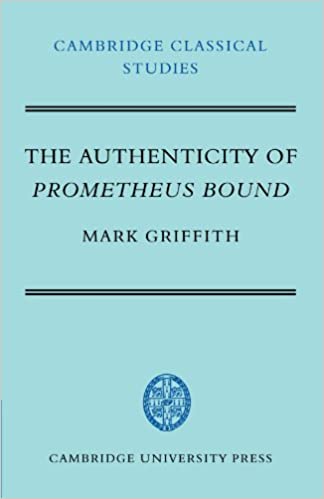The Authenticity of Prometheus Bound by Mark Griffith

The Authenticity of ‘Prometheus Bound’ by Mark Griffith
1977: Cambridge University Press
When Mark Griffith began researching this topic for his doctoral thesis he believed in the authenticity of Prometheus Bound as a work by Aeschylus, but came to the the conclusion “that the evidence which I was assembling showed Prom. consistently behaving quite differently from the six undisputed plays of Aeschylus, and I was driven to believe that another hand was probably at work…. We know too little to be certain about anything: I am concerned here merely with argument from probability.” (xi)
True to his word, Griffith realizes that his work is “heavy going for the non-specialist, as they depend on technical and detailed analysis of the practice of the three major tragedians.” (xii) Griffith looks at the works of Sophocles and Euripides as well as that of Aeschylus in order to “measure where Prom. stands in relation to all three.” While differences in technique may be excused in order for the changes to fit the plot or staging, “the most satisfactory and genuinely objective criteria are to be found in the study of metre.”
A quick look at limited external evidence proves uncertainty as to authorship, which is why the central focus is on the internal evidence. Griffith’s longest section compares the lyric metres of Prom. to the six plays known to be by Aeschylus. Griffith notes the lyric metres “fail to exhibit the characteristics common to those six plays.” (67) All of this I’m having to take on faith since much of this is way above me, even more so when Griffith looks at the recitative anapests, iambic trimeters, vocabulary, style, and syntax. In each case, though, Griffith believes the facts either “point unmistakably away from Aeschylean authorship” as the peculiarities are much greater in number or stranger in nature from the six undisputed plays. The vocabulary reflects that there is a “fundamental difference of natural style” while certain parts fall “outside the patterns we find in his work.”
Other areas are harder to judge. Griffith notes that there are many more sophistic preoccupations (rhetoric and cultural history in particular) from the other plays, but part of that is due to a much different subject matter. As he notes, though, the sophistic jargon in Prom. is much different from what is included in the other plays. Griffith also looks at how the play came to be attributed to Aeschylus (most likely at the Great Library of Alexandria) and other possible authors of the play. He lists several potential authors, including members of Aeschylus’ family, and the possibility that the play may have multiple authorship. He concludes, “Further speculation [into authorship] is amusing but pointless: we do not know who wrote Prometheus Bound—that is almost all we can truly say.”
What is clear is that Griffith believes the probability that Aeschylus wrote it is extremely low given the multiple, significant differences from the style in his other attributed works. But, as he carefully notes, he would not be surprised if something in the future would turn up that would confirm Aeschylus’ authorship. Given what we currently have available, however, he believes his authorship to be unlikely. While some scholars agree with Griffith’s conclusion that it is unlikely Aeschylus wrote the play (notably Martin Litchfield West), there are many other scholars who believe in Aeschylus’ authorship.
Not that this changes the quality or impact of the play…it stands or falls on its own merits, but I wanted to present some of the general points in Griffith’s work since his is probably the most detailed in laying out why it is unlikely that this is an Aeschylean play.